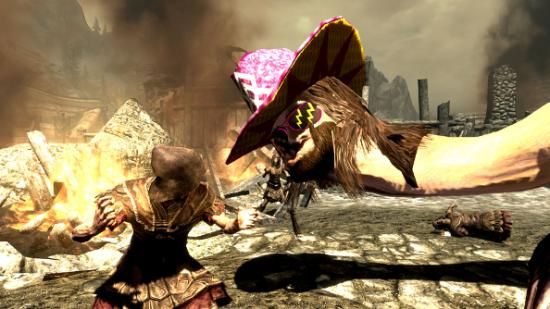On Thursday April 23rd, Valve introduced paid-for Skyrim mods to the Steam Workshop. But by the following Tuesday, they’d been whisked away again. The interim saw community uproar, creator disagreement and protest mods – leading Valve to conclude that they hadn’t given the matter due thought. They’ve since retired to the mail room to read through six months’ worth of forthright feedback emails.
Though the implementation was flawed, the dream was more difficult to argue with: an opportunity for modders to work on their creations full-time if they fancied it, and a reason for developers to support their communities with better tools.
We asked some of the minds behind mods like DayZ, Garry’s Mod and DSFix about the ways they’d patch Valve’s imperfect system.
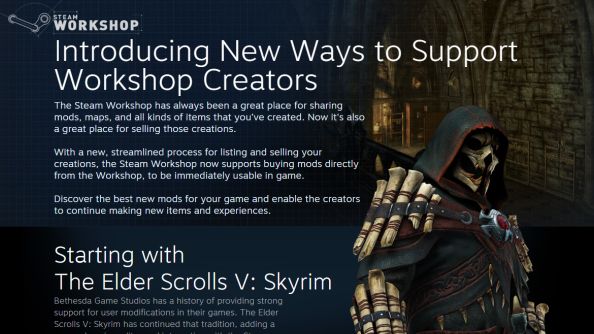
All of the modders and developers we spoke to were in agreement: good things could come from a Steam-integrated system of mod payment. But the details matter.
What are the benefits?
Peter ‘Durante’ Thoman has found his calling in fixing the clumsy PC ports of major publishers; his DSFix has become a near-essential download for Dark Souls players. And, while he’s not personally interested in monetizing his work, he believes the option would bring with it “significant advantages”.
He echoes Valve in noting that paid mods which offer a cut to publishers could provide developers with clear incentives to build modding tools – turning a “cost with nebulous benefits to something with a well-defined payoff”.
Moreover, he argues, the general public tend to take a paid pursuit more seriously than a hobby – treating it with more respect.
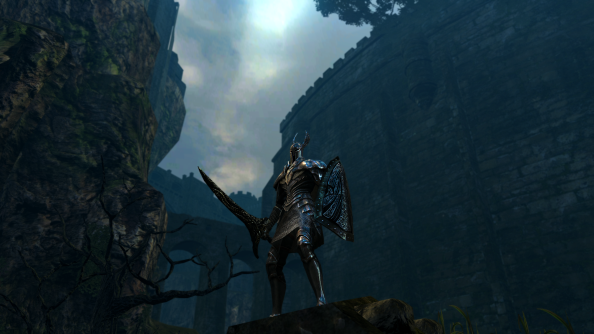
“You can certainly discuss whether this is a good thing and what it says about society, but it is a fact,” said Thoman. “Thus, modders could go from ‘people who spend way too much time at the computer’ to ‘people who use their skills to create something valuable to others’ in the eyes of those unfamiliar with modding’.”
The hope is that the chance of recompense would provide more modders with enough motivation to keep them hammering away at their work – often conducted in the small hours with inadequate tools over long years.
Garry ‘Garry‘s Mod’ Newman was made a millionaire thanks to a mod sold by Valve – a decision that also faced a certain amount of resistance at the time – and has maintained and updated that mod for nearly a decade since.
“I can understand the reversal and I can understand why people hate [the idea],” he said. “I still support it.
“I like the idea that someone could spend a couple of months of their life working on a mod for a game, then making enough money out of it to give up their job and work on it full time.”
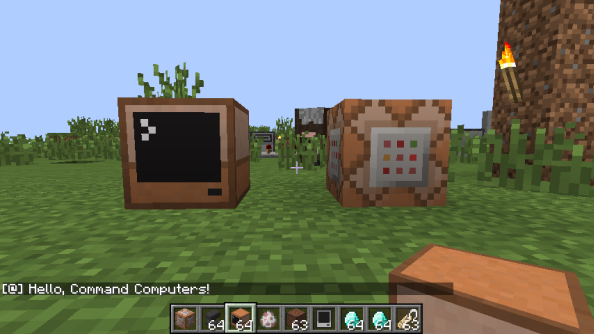
For similar reasons, Daniel ‘dan200’ Ratcliffe, the brain behind the beloved Minecraft mods ComputerCraft and qCraft, thinks that finding modders a revenue stream is a “really great idea”. He points out that the standard career advice for modders who want to make a living from their skills is to get a job at a AAA studio – as he has in the past – or develop a new game from scratch – as he is doing now. Neither course bodes well for the mods that have made them successful – most often abandoned for lack of free time.
“If only a little of the value provided by successful mods could make its way into modder’s pockets, they could keep working on what they’re best at,” reasoned Ratcliffe. “And players would get more of the mods they enjoy.”
DayZ producer Brian Hicks is closely tied to the modding scene at OpenDayZ.net, and has spent time modding himself during off-hours.
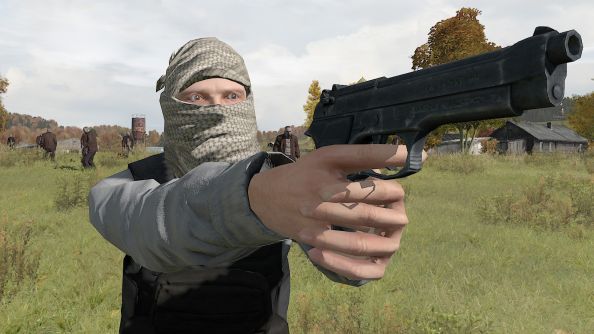
“I’ve worked with, and seen people put thousands of hours of hard, dedicated work at zero profit into mods that have arguably increased sales greatly for their base titles,” he said.
Not only is it good for modders to have a platform to sell their work, thinks Hicks, but it is their right. We as consumers are not “inherently entitled to someone else’s work for free”.
“The modding scene is a post-ship, opt-in scene,” he pointed out. “You do not have to download someone’s mod to experience the title you purchased. Modding is ‘icing on the cake’ – icing that is created by the hard work and dedication of someone else. If they should choose to want to monetize, that is both their choice – and their risk.”
So, given all this good that can come from embracing paid mods – and the arguable moral imperative for doing so – why was Valve’s system met with such widespread ire last week?
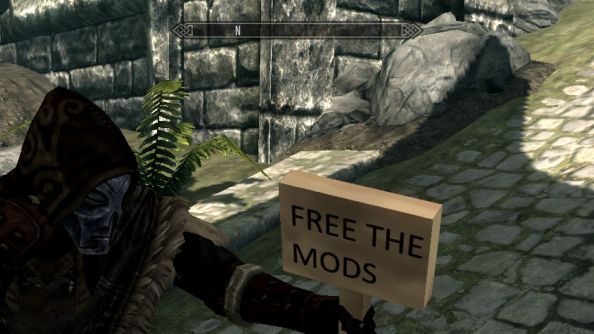
What went wrong?
Thoman, Ratcliffe and Hicks all suggest that Skyrim made a bad first candidate for Valve’s program – a game with a well-established modding community and an existing Workshop ecosystem.
Jonathan Wising, of Make Something Unreal winners Dead Shark Triplepunch, said that it was “too easy to make money off someone else’s work”. The fact that mods commonly comprise the work of other amateurs led to early controversy when modder Fore objected to the appearance of his animations in a paid fishing mod.
And then there was the revenue split: the usual 30% for Valve’s services, 45% for Bethesda, and the remaining 25% for the modders. Under Valve’s system, the publisher decides their own percentage, and Bethesda say that “much consultation and research” went into deciding the number. But for many, it felt unfair.
“I’m no economist, and people more familiar with the situation have actually claimed convincingly that the conditions are favourable compared to licensing an existing IP,” said Thoman. “But 25% as a number just feels wrong.”
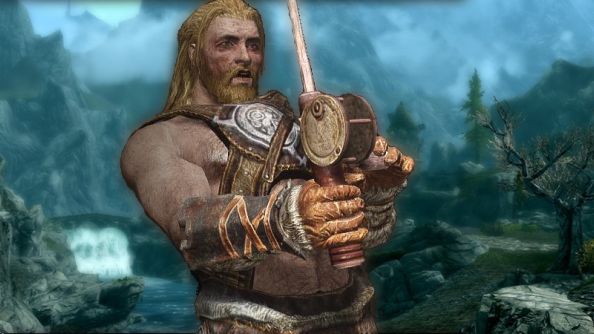
Newman said the split seemed like a “big miscalculation” by Bethesda.
“I would really be embarrassed to suggest taking 75% of the profit on someone elses hard work without any real justification,” he said. “This should really be a way of empowering the modding community, not a way for developers to exploit the hard work of modders to make money.”
The fact that the profit split wasn’t properly explained by Valve was a problem, said Hicks. Ratcliffe thinks the percentage fed “users’ impressions that this was a ‘cash grab’ from Valve”. Certainly, by the time the system was deactivated, Steam’s owners were being decried as greedy.
“This mod removes every imperial from the game, effectively breaking the game,” read the description of protest mod No more imperials. “Just like how valve broke the modding community.”
The legitimate mods that did get posted on the store, said Ratcliffe, were in “dire need of some curation”.
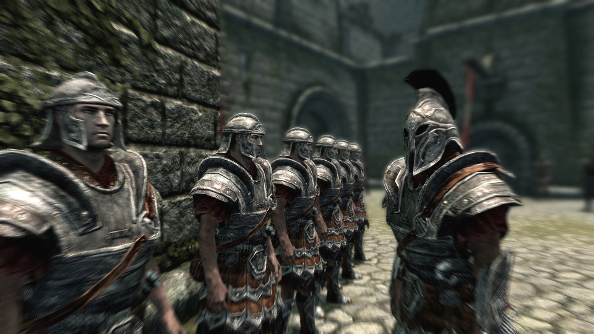
“I don’t like the idea that someone could spend a day making a crowbar model and ask people to pay for it – and that was the impression the Skyrim stuff gave,” added Newman. “It didn’t show how users would get better quality mods – it showed them how they’d be paying for what they already were getting for free.”
It’s clear that Valve faced a struggle to change the mindset of players who have found mods to be a wonderful way of extending the life of games they already own.
“The trouble is,” said Ratcliffe, “users are very used to getting mods for free, so asking them to pay for them now feels to them like having something taken from them. Hence the visceral, angry reactions we’ve seen from them in the last few days.”
Hicks believes that the system was victim to “a loud vocal minority of young, or impressionable PC gamers with limited disposable income”. While Thoman was “disappointed” with the reactions of some users – “who resorted to insulting or even threatening modders producing paid content”.
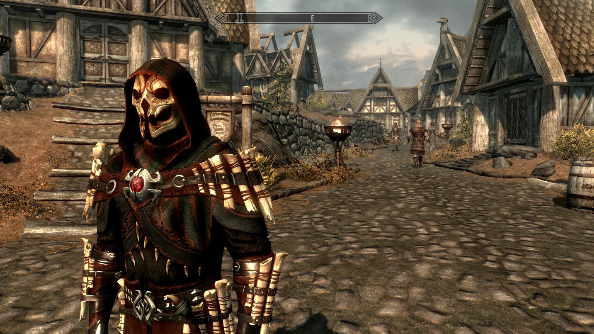
How can it be fixed?
The developers and modders consulted were near-unanimous in hoping that Valve would return with a revamped paid mod system – but there are conditions.
“In order to properly pave the way it is critical that the profit split, curation, and dashboard placement is properly explained,” said Hicks.
“I would boil it down to one essential rule,” said Thoman. “Both paid mods and free mods must be able to coexist, and they must be given the same space, access to features and care without discrimination. As long as this rule is held up I support adding new options for modders, and as soon as it is violated I’ll be throwing torches with the mob.”
Perhaps, given the right game and degree of transparency to overcome its teething issues, the paid mod utopia isn’t so far away.

“If the issues were fixed and premium modding was allowed to grow, I’m confident that quality content would eventually win over enough detractors to make a healthy marketplace that benefits players, modders and game developers,” said Thoman.
Hicks foresees that quality mods will filter up through sales and user feedback – and the ‘shit’ will “filter down to the bottom and die out” – as it does on the Steam Store.
“As I see it, allowing monetization of quality mods not only can create a new budding indie industry and foster strong new talent into the industry,” he said, “it can push mod-supported titles more into the spotlight, and begin to make developers approach their titles and tools more in the mindset of a ‘long tail’ platform provider and less in a ship it, sell it, move on to the next project mentality.”
Thanks to Durante, Dan200, Brian Hicks, Garry Newman and Jonathan Wising. Over the page: their full comments as they were provided.
Thanks to Durante, Dan200, Brian Hicks, Garry Newman and Jonathan Wising. Below: their full comments as they were provided.
Durante
In general, I’d like to first note that I’m not personally interested in paid modding, since this is usually one of the first things people ask about — or worse, assume.
That out of the way, I believe that the option existing could have significant advantages. In particular, beyond the often-discussed ability for people to dedicate more time to modding, there are some potential secondary benefits which I have only rarely seen mentioned.
For one, there is the fact — and you can certainly discuss whether this is a good thing and what it says about society, but it is a fact — that the general public takes a paid pursuit more seriously and treats it with more respect than a hobby. Thus, modders could go from “people who spend way too much time at the computer” to “people who use their skills to create something valuable to others” in the eyes of those unfamiliar with modding, and this can certainly be a huge boon to motivation.
Secondly, from the perspective of game developers, supporting modding could go from a cost with nebulous benefits (from their perspective, I think the benefits are already clear) to something with a well-defined payoff. This could result in companies which have previously refrained from supporting mods, or even actively sought to prevent modding of their games, becoming more supportive of the practice.
That said, there were definitely some issues with how paid mods were introduced for Skyrim. First of all, it’s probably not a good idea to make such a step at a point in time where the modding community is already well-established for a game. And then of course there is the issue of the relative revenue split. I’m no economist, and people more familiar with the situation have actually claimed convincingly that the conditions are favourable compared to e.g. licensing an existing IP, but 25% as a number just feels wrong. However, even with these issues in the system I was still more disappointed with the reactions from some members of the gaming community, who resorted to insulting or even threatening modders producing paid content, than in the initiative itself.
Anyway, if you ask me now how things *should* work, I would boil it down to one essential rule: both paid mods and free mods *must* be able to coexist, and they *must* be given the same space, access to features and care without discrimination. As long as this rule is held up I support adding new options for modders, and as soon as it is violated I’ll be throwing torches with the mob.
Dan200
First off: I think that fundamentally, finding a revenue stream for mod developers is a really great idea. As it is right now, mods provide a huge amount of value to players, but the standard career advice for modders who want to make a living from their skills is to get a job at a triple-A studio, or to develop a new game from scratch, both of which usually result in the mod that players love being abandoned. If only a little of the value provided by successful mods could make its way into modder’s pockets, they could keep working on what they’re best at, and players would get more of the mods they enjoy.
The trouble is: users are very used to getting mods for free, so asking them to pay for them now feels to them like having something taken from them. Hence the visceral, angry reactions we’ve seen from them in the last few days.
Some of Valve’s specific decisions with the Skyrim mod system didn’t help either: The revenue cut for Modders was far too low, feeding users impressions that this was a “cash grab” from Valve, and the mods that did get posted on the store were in dire need of some curation. Valve also confessed that it wasn’t the best idea to try this experiment on a big game like Skyrim with an established modding community and way of doing things.
I do hope the system comes back though, and other developers can be allowed to implement it. If the issues were fixed and premium modding was allowed to grow, i’m confident that quality content would eventually win over enough detractors to make a healthy marketplace that benefits players, modders and game developers.
Brian Hicks (Bohemia Interactive)
(It should be noted that this is my personal opinion, and not that of Bohemia Interactive)
From where I stand – the whole P2P Monetization on Steam was a victim of mishandling, and a loud vocal minority of young, or impressionable PC gamers with limited disposable income.
Obviously, coming from a project leadership position on a title like DayZ – in a company such as Bohemia leans me in favour of the modders. Modding is a core tenant for most Bohemia titles. DayZ especially, as both Dean and I have said from the beginning that we want to enable both the modders and the modding community to have as accessible an experience as possible with the title. Being a Steamworks title that means we’re going exclusively Steam Workshop.
Having spent time modding myself during my off hours, and being closely tied in with the DayZ Mod scene over at OpenDayZ.net I’m very aware of how passionate, and hard working a lot of modders can be. I’ve worked with, and seen people put thousands of hours of hard, dedicated work at zero profit into mods that have arguably increased sales greatly for their base titles.
From where I stand it breaks down into a few simple points:
- As consumers, you are not inherently entitled to someone elses work for free.
- The modding scene is a post-ship, opt-in scene. You do not *have* to download someones mod to experience the title you purchased.
- Thus, modding is “icing on the cake” – Icing that is created by the hard work and dedication of someone else.
- If they should choose to want to monetize, that is both their choice – and their risk
- Much like the Steam Store itself, quality titles will filter up through sales, and user feedback – and the “shit” will filter down to the bottom and die out
- Curation was not properly explained by Valve
- The profit split was not properly explained by Valve – as the configuration (percentages) is up to the publisher
- Valve should have started the program on a title without an existing Workshop ecosystem
It is my hope that Valve will regroup, and approach this again on a title that does not have an existing Workshop presence. In order to properly pave the way it is critical that the profit split, curation, and dashboard placement is properly explained.
As I see it, allowing monetization of quality mods not only can create a new budding indie industry and foster strong new talent into the industry – It can push mod supported titles more into the spotlight, and begin to make developers approach their titles and tools more in the mindset of a “long tail” platform provider and less in a ship it, sell it, move on to the next project mentality.
Garry Newman (Facepunch Studios)
I can understand the reversal and I can understand why people hate it. I still support it.
I think how it was done with Skyrim showcased the shitty way the system would be used. I like the idea that someone could spend a couple of months of their life working on a mod for a game, then making enough money out of it to give up their job and work on it full time. I don’t like the idea that someone could spend a day making a crowbar model and ask people to pay for it – and that was the impression the Skyrim stuff gave. It didn’t show how users would get better quality mods – it showed them how they’d be paying for what they already were getting for free.
The revenue share too. I would really be embarrassed to suggest taking 75% of the profit on someone elses hard work without any real justification. That seems like a big miscalculation by Bethesda. This should really be a way of empowering the modding community, not a way for developers to exploit the hard work of modders to make money.
Jonathan Wising (Dead Shark Triplepunch)
It’s a nice thought to be able to make some money of your mods but I see a few to many problems with just letting anyone sell their creation.
I think a pure donation system could work granted that there is a way to actually tell who created the mod.
The biggest problem I see, even with just a donation system is that other people can steal mods from their original creators and re-upload them for profit.
No spare time modder will be able to make proper copyright claims or have time or money to file a lawsuit.
It’s just too easy to make money of someone elses work.
However if that was solved somehow, donations in conjunction with something like a green-light system where a mod has to receive a certain score to be able to transform in to a payed modd might work.
That’s what I think at least.
